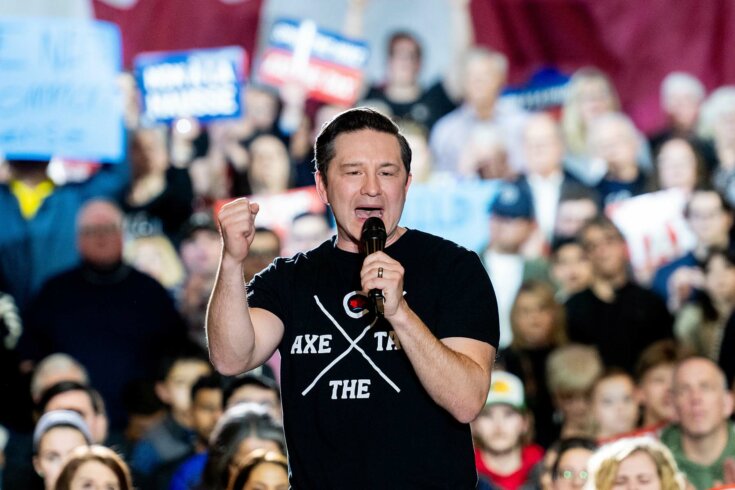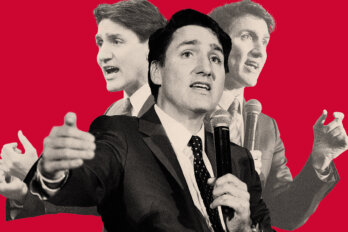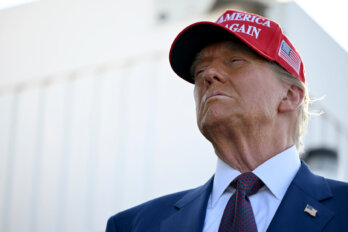Remember Brexit? That time a Conservative Party directed widespread voter frustration at a single easy scapegoat, smothered the public with misinformation, and were rewarded with their biggest electoral victory in decades? Something similar is happening today in Canada.
The scapegoat this time is the “carbon tax.” That’s actually just one part of a complex carbon-pricing policy that imposes a fuel charge on consumers and industry alike while delivering a rebate directly to most Canadians. The principle is simple: raise the cost of something and people find ways to use less of it. But it’s also ripe for slander, because the fine print is so complicated: the amount you pay and are reimbursed depends on where you live, how much you make, how big your family is, and what you do for a living. Plus, while the government calls it “carbon pricing,” most people know it simply as a “tax.”
The carbon tax and rebate increase every year, on April 1, and so does the uproar. Regardless of the increase in rebate, the fact that the price of gasoline went up 3.3 cents per litre handed Conservatives a golden marketing opportunity for their party’s policy of ignoring climate change—now in its fifth season of masquerading as an “Axe the Tax” campaign.
“There will be a carbon tax election,” Pierre Poilievre, leader of the federal Conservative Party, promised on that day this year. Premiers across the country quickly picked up the refrain, demanding a group sit-down with Prime Minister Justin Trudeau to discuss the carbon levy. In a sign of the movement’s momentum, one of Canada’s two Liberal premiers, Andrew Furey of Newfoundland and Labrador, joined as well.
You have to give Conservatives credit for transforming the most boring subject on earth into a compelling election issue. They’ve drawn attention away from the glaring void where a Conservative climate policy should be while turning roughly half the electorate against a policy most barely comprehend.
Exasperating polls abound. This one from January found almost 45 percent of voters don’t believe a carbon price helps lower emissions (it does, according to this study of 142 countries with a carbon price). Half of eligible respondents were unaware they’d ever received a carbon tax rebate, directly deposited into the bank accounts of everyone who files taxes (the government is now forcing banks to label the quarterly payments as “Canada Carbon Rebate,” according to the Canadian Press). The same poll found 47 percent of Canadians believe the carbon tax is a major cause of inflation. “These perceptions are not just knowledge gaps; they are potent narratives that have taken root in the public consciousness,” wrote David Coletto, founder and CEO of Abacus Data, in January.
To be fair, most people don’t have time to scrutinize the intersection of tax policy and atmospheric science. But if we’re going to have a carbon tax election, it has to be said: non-partisan experts who actually study the matter tell a very different story.
That is: the carbon tax has a negligible impact on inflation; most Canadians—all except the wealthiest 20 percent—receive more from the rebates than they pay at the pump and elsewhere; and the carbon tax does, in fact, help lower emissions. “The reason carbon pricing works is simple,” explained a recent open letter signed by over 300 economists from around the country. “When something costs more (in this case fossil fuels), people use less of it.”
That’s not to say it couldn’t be improved. But Conservatives are out for destruction, not reform. And with Poilievre’s drum beat, “carbon tax” has acquired a new meaning, simultaneously broader and more specific than any market incentive. It’s become a symbol of awful governance, a synonym for “Fuck Trudeau.” And it’s working. Were an election to be held today, Conservatives would cruise to a huge majority. In an Abacus Data poll from January, almost a quarter of those who said they wouldn’t vote Liberal cited the carbon tax as a reason. That’s hardly the only factor in play, but Poilievre clearly regards it as the biggest. That’s why he’s framing the next election as a referendum on the carbon tax.
Trudeau looks all too happy to oblige. In recent weeks, he’s delivered a full-throated defence of the carbon tax in multiple interviews, speeches, and press conferences. He also offered to work with any province that showed him a better plan to lower emissions. In the ensuing silence, you could almost hear the prime minister think: A carbon tax election? What luck!
This framing makes it look like Trudeau’s Liberals are doing too much about climate change rather than too little. That’s quite a gift to the party that invested more than $30 billion of taxpayer money in the Trans Mountain pipeline (which starts flowing on May 1), greenlit the country’s first large-scale LNG export facility (LNG Canada intends to start shipping next year), and has yet to implement the emissions cap on oil and gas it promised years ago. Under Trudeau’s Liberals, according to the Financial Post, Canadian oil and gas production has risen twice as fast as it did under his Conservative predecessor, Stephen Harper. In February, the oil sands set a new production record, pumping more oil than in any February in history.
In fact, the Liberals’ entire climate policy is designed not to interfere with oil and gas production—an uncomfortable truth for Liberals and Conservatives alike. This applies well beyond the carbon tax, which is just one part of the government’s sprawling Emissions Reduction Plan. That plan covers everything from clean energy production, battery plants, and heat pump subsidies to electric vehicle mandates—everything, that is, except meaningfully tackling the single biggest source of Canada’s emissions.
The Liberals have pretzelled our entire economy around the goal of reducing emissions without touching the oil sands. Somewhat incredibly, it’s working. Canada is on track to lower emissions 34 percent below 2005 levels by 2030. But this happens only if the current policies are kept in place, the carbon tax included. Obviously, if Poilievre becomes prime minister, it won’t be. He hasn’t suggested replacing the carbon tax with anything at all, let alone something better, because neither he nor the majority of his party’s voters believe climate change is even a thing. An Angus Reid poll released in April found just 33 percent of Conservative Party voters agree that “climate change is a fact and is mostly caused by human activities.” Small wonder they don’t want to do much about it. The party’s leadership is of the same mind, their words and actions painting a caricature of denial that speaks louder than any public opinion survey.
Alberta premier Danielle Smith blamed last year’s catastrophic wildfires on arsonists, then dropped a seven-month ban on clean energy projects. Ontario premier Doug Ford’s very first act in power was to scrap the province’s cap-and-trade system. Saskatchewan premier Scott Moe complained without irony that his province considered alternatives to the carbon tax but found them too expensive. Looming above is Poilievre, who, when asked about his own climate policy, mutters vaguely about clean energy or carbon capture or replacing Chinese coal with Canadian gas, before quickly pivoting back to the need for more pipelines and less taxes.
There’s just one problem with that strategy: most Canadians are well aware that “climate change is a fact and is mostly caused by humans”—89 and 90 percent of Liberal and NDP voters respectively agree, along with 78 percent of Bloc Québécois voters and (somewhat oddly) 77 percent of Green Party voters. This means a majority of Canada is directly at odds with the Conservative Party position on an issue of major importance. And here comes summer.
Wildfire season is already underway in BC and Alberta, where a severe years-long drought issue carried straight through winter. Rivers and aquifers throughout Western Canada and parts of the North are going into the hot season in worse shape than this time last year. Farmers, from Vancouver Island to Saskatchewan, are bracing for another parched summer, while oil and gas producers—the thirstiest industry—have been warned they may have to curtail production. Soon, the boreal will start burning.
Last year was the hottest in human history. Extreme weather cost Canadians over $3 billion in property insurance alone in 2023. Prairie provinces spent billions more on drought insurance for farmers. More than 200,000 people were evacuated from their homes because of wildfires. Some 1.5 million Canadians struggle to insure their homes because of flood and fire risk. These numbers will get worse before they get better.
Trudeau’s calculations surely include the fact that possibly two more summers, or at least one, lie between now and the next election. He knows the impact these will have on the news cycle and our national psyche. He knows how Conservative Party voters will respond. They’ll blame arsonists or fake news or say the middle of an emergency is no time to point fingers. If cornered, they’ll protest that Canada can’t solve this global problem on its own, as if the world’s fourth largest producer of oil has no role to play.
Trudeau also knows that most Canadians are worried about climate change, even if they often have more pressing concerns. Paradoxically, this appears to have led Trudeau and Poilievre to finally agree on something: the lovely ring of a “carbon tax election.”
With thanks to the Trottier Foundation for helping The Walrus publish writing on climate change and the environment.





